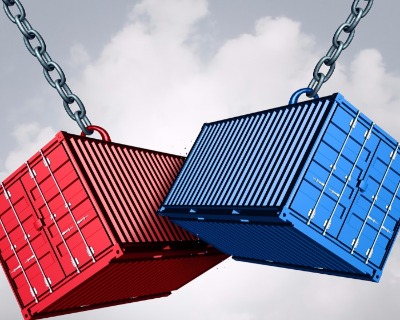Book Launch: The Weaponization of Trade
Rebecca and Jack Harding, authors of upcoming book ‘The Weaponization of Trade’, outline how trade is fast becoming a tool of foreign policy aggression, why a rise in the trade of dual-use and military goods is playing into this trend, and what this means for trade finance.

In what way has trade become weaponised? What’s driving this?
Rebecca Harding (RH): In the era of globalisation, from the end of the Cold War until about two years ago, trade was seen as a benign instrument of policy – as a non-zero-sum game from which everybody could benefit. Since 2014, this has changed and trade is increasingly being used as a tool of foreign policy. Governments are using trade to coerce other countries into alignment with their views. US President Donald Trump, for example, has been using the threat of sanctions against countries that trade with North Korea.
Some of that has come from the rise of populism, where people are disaffected because of feeling excluded from the benefits of globalisation. By harnessing that populism around a common enemy, it’s very easy to create a rhetoric that wins votes. We’ve also seen large countries begin to realise they’re now competing with countries they weren’t competing with 20 years ago. So, at a macro and a micro level, sensitivities are building up.
This trend is very dangerous for trade practitioners because it creates an environment where they cannot isolate reality from fake news or ‘artificial intelligence’. If Trump did abandon all trade agreements and launch a trade war on China, he would destroy most of America’s – and the world’s – trade. It would be a mutually ensured economic destruction. But trade practitioners can’t work out whether Trump’s threats are serious and such uncertainty is difficult to work with.
Jack Harding (JH): Trade has always struck a balance between being driven by both economics and politics, but our book argues that the balance is tipping. The concern is that economic benefits have now been ‘Trumped’ by politics.
The current language around trade is perhaps the most damaging. Some of the rhetoric used by Trump has created an ‘us versus them’ mentality when it comes to trade. Just look at the emergence of slogans like ‘America First’ or the UK’s ‘Exporting is GREAT’.
In May, we saw Trump refer to the Germans as ‘bad, very bad’ based on their export of cars. This quite bizarre sense of outrage at another nation’s trade surplus is almost unprecedented. And it was not long after this, and some of the UK’s language around Brexit, that German Chancellor Angela Merkel said the US and UK were no longer reliable partners. You saw an almost immediate impact from that quite irresponsible rhetoric.
RH: It’s also become much more difficult to define what trade is, which has made it more open to manipulation to politics and more complicated from a trade finance perspective.
We’re not measuring barrels of oil traded between countries anymore. Increasingly, we’re seeing manufacturing as a service. If you look at a German tunnelling company, for example, as well as providing tunnelling equipment it probably offers engineering consultancy and after-care. The whole value chain is bedded into trade and physical goods and services have become much more closely related with one another. So we no longer know exactly what the true value of trade is – it’s become very much more nebulous than it was 20 or 30 years ago.
In the days of the traditional letter of credit, you had a thing moving from A to B. But if the trade of a service rather than a physical good is being financed, do you call it working capital or open account? From a trade finance perspective, that makes life more complicated. There are obviously digital solutions to all that beginning to evolve, but trade is changing too quickly for many of them to keep up.
You talk a lot about the trade of dual-use and military goods in the book. Why is this so problematic?
RH: A substantial increase in the global trade of dual-use goods, which by definition have both military and civilian applications, is making trade even harder to measure and define. If, for example, you export a security system, not only is it hard to separate the trade in physical hardware from the trade in services provided by engineers, but it’s difficult to distinguish whether it would be used at its destination for military or civilian purposes. This makes trade in dual-use goods a very powerful political tool.
JH: Insofar as you can measure state strategy, we think the dual-use goods sectors that we have identified in the book, as well as arms trade, proxy quite well for the strategic intent of a nation.
In the book, we studied the export of dual-use goods and arms and ammunition from developed countries like the UK, US, Germany or China to less developed nations across the Middle East and Sub Saharan Africa.
If you look specifically at arms trade, we found that countries whose imports of arms and ammunition grew more than 40% year-on-year from 1989 to 2015 are five times as likely to experience political instability than a country with lower arms trade growth. We also found that a country with low GDP per capita is four times more likely to experience political instability than a country with high GDP.
So arms trade, particularly in less developed countries, is a big part of the problem.
What does this mean for trade finance practitioners?
RH: This is a dangerous time for trade finance. There are a lot of uncertainties out there and I don’t think trade finance has picked up to the extent that people were expecting it to at the beginning of 2017.
Know Your Customer (KYC) and Anti Money Laundering (AML) regulations have created a clear fall-back in world trade since 2012, and particularly since 2014 when oil prices collapsed.
One of the policy conclusions we’ve drawn in our book is that by continuing to use arms and ammunition trade as a means of creating influence in a region, governments send mixed messages to the commercial sector.
What’s beginning to happen is that banks may want to return to financing some of these dual-use or arms sectors because Trump and UK Prime Minister Theresa May have signed trade deals with Saudi Arabia and say that doing so is in their countries’ strategic interest.
The problem is that if a bank does that without the say-so of the government, they’re likely to be in breach of arms treaties, of KYC and AML regulations, and to be fined.
We argue that a structure should be created where it’s absolutely clear that if banks do something wrong, they should be fined, but in which banks equally have the same type of transparency on what is the government’s true point of view.
It’s vital that banks know when they are breaking the rules and when they aren’t breaking the rules. Governments and banks need to work together to clarify this.
‘The Weaponization of Trade’ is published by London Publishing Partnership and is available from October 25, 2017 for £9.99. Pre-ordering is also possible through Amazon or at http://londonpublishingpartnership.co.uk/wot-advance-purchase/





